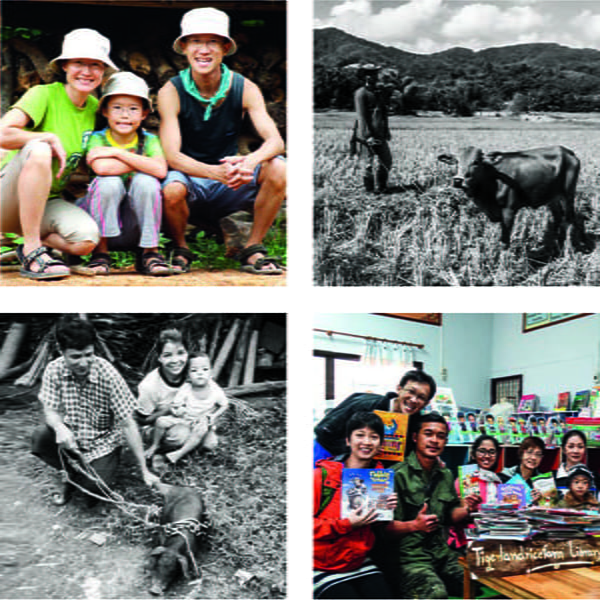Stories > Seeds of Friendship
Seeds of Friendship

Yongyoot Watasittikul (left) and Alvin Yong working on Tigerland Rice Farm.
Serial entrepreneur Alvin Yong helps improve the lives of rice farmers through a unique travel experience.
BY ALYWIN CHEW
PHOTOS ALVIN YONG
ingaporean Alvin Yong met his business partner, Yongyoot Watasittikul, when he was on holiday with his family in Chiang Rai, northern Thailand, in December 2007.
Yongyoot, more commonly known as Kitt, is from the Sgaw Karen hill tribe. He had taken them on a tour during which he talked about his family’s rice farming practices. Kitt is a new-generation Karen who hopes to preserve Karen hill-tribe traditions and culture through educational tourism. This intrigued Yong, who developed a keen respect for the rice farmers and returned to Chiang Rai the next year to learn more about what they do.
He decided to raise awareness of the efforts of farmers as well as the rich culture of the various hill tribes in northern Thailand. So he set up social enterprise Tigerland Rice Farm with Kitt in 2009.
Located about 30 minutes away from Chiang Rai city by car, the farm offers travellers an experiential homestay during which they can learn about rice planting and harvesting processes, interact with villagers from the local hill tribes, and take part in yoga and meditation sessions amid the tranquillity of the rice fields. Through the farm, Yong and Kitt hope to help urbanites such as Singaporeans better appreciate nature, and introduce them to the lifestyle and culture of hill tribe farmers. At the same time, they also hope to give back to the local community by introducing social projects to improve their livelihood.
“All the villagers here like Alvin. He is the sort of person who will make time and help others even though he is very busy. Because of what he has done, the villagers no longer have to move far away to look for better-paying jobs. ”
Yongyoot Watasittikul, co-founder of Tigerland Rice Farm
Kitt is in charge of the farm’s day-to-day operations, while Yong is responsible for managing its website as well as branding and marketing. The place is named after Kitt’s late great-grandfather, who used to be called “Tiger” by tribe members. He had purportedly killed a tiger that was preying on the villagers.
The farm is a passion project for Yong, 51, a serial entrepreneur. He says: “My passion is to encourage more business people to support social enterprises.’’ The bulk of the farm’s revenue goes to Kitt’s family as well as to community initiatives in Chiang Rai. Yong receives only 30 per cent of the revenue from bookings made by Singaporeans – about 10 to 20 every year, he says. Most of Yong’s income comes from other wellness enterprises that aim to help people find inner harmony and lead a healthy life.
GIVING BACK
Since 2014, Yong and Kitt have started three social projects, which have helped raise the standard of living for local villagers. One of them is the Raise-a-Library project, which aims to improve the English proficiency of children from the local hill tribes. So far, the duo has collected more than 2,000 books in English and set up libraries in nurseries and primary schools in the villages.
The other two projects, Raise-a-Piggy and Raise-a-Moo-Moo-Cow, are what Yong calls self-sustaining social investments, seeded by donations from Singaporeans. The Raise-a-Piggy project was started in September 2014 through a donation of S$360 from two Singaporeans. The money was used to buy six piglets for six villagers. Each villager rears a piglet for about a year before selling it off for a profit. Each of them then returns the initial cost of the piglet to the farm so that Yong and Kitt can continue to buy more piglets for other villagers. The villagers keep the rest of the profits, which they use to pay for essentials such as their children’s education and home improvement. The project now has 60 piglets as of January this year.

Yong and his family first met Kitt during a holiday to northern Thailand in 2007; a benefi ciary of the Raise-a-Moo-Moo-Cow project; more than 2,000 books have been collected for the Raise-a-Library project; a family with their piglet from the Raise-a-Piggy project.
The Raise-a-Moo-Moo-Cow project, which started this year, does the same, but with cows instead of pigs. A Singaporean helped raise S$1,800, which was used to buy three cows. The cows are currently on loan to three families, who milk the cows and sell the milk for extra income. The cows have to be returned in around two years’ time, but each family gets to keep a calf, thus ensuring the sustainability of the project.
The projects have done a lot to bring different communities together. Kitt, who has never been to Singapore, is eager to learn more about the country after his interactions with Yong and Singaporeans who visit the farm. He says: “I want to take my family to Singapore to visit one day. Tigerland Rice Farm and Singaporeans are one family – we are the Tiger family.
“All the villagers here like Alvin. He is the sort of person who will make time and help others even though he is very busy. Because of what he has done here, villagers no longer have to move far away to look for better-paying jobs.”
